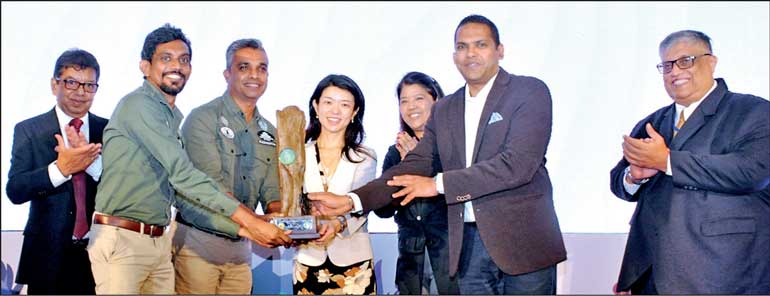Monday Feb 23, 2026
Monday Feb 23, 2026
Thursday, 30 May 2024 00:00 - - {{hitsCtrl.values.hits}}

The Barnhouse Studio, Panadura receiving the Best Sustainable Tourism Project Award from Tourism Minister Harin Fernando and UNDP Sri Lanka Resident Representative Azusa Kubota as SLTDA Chairman Priantha Fernando (left) and Director General R. Sariffodeen applaud – Pic by Lasantha Kumara
By Charumini de Silva
In a bid to boost sustainable tourism, the Sri Lanka Tourism Development Authority (SLTDA) in partnership with the United Nations Development Programme (UNDP) awarded the National Sustainable Tourism Certification (NSTC) to over 100 small and medium enterprises (SMEs) in the sector yesterday.
The initiative aims to engage all tourism stakeholders, including Government agencies and the private sector, to foster a more sustainable tourism industry aligned with national priorities.
The certification is part of a broader strategy to encourage environmentally responsible and inclusive practices within the industry.
The collaboration introduced in 2018, saw the successful completion of the pilot phase in 2019 for the accommodation sector and in 2023 a call for applications was opened for SMEs in the sector. The NSTC scheme was reintroduced after a five year lapse following multiple challenges the industry faced. As of end 2022 only 37 certificates were awarded, whilst during 2023 a total of 100 certificates were presented.
Speaking at the event, UNDP Sri Lanka Resident Representative Azusa Kubota highlighted the economic potential of nature and biodiversity, emphasising their role in economic development and growth. “Investing in biodiversity supports job creation, income growth and sustainable economic development. With unemployment in Sri Lanka at 5.2% last year and even higher rates among youth, initiatives like this are crucial for inclusive and sustainable economic recovery,” she said. Kubota also addressed the social stigma faced by women in the tourism sector, noting that such biases hinder economic progress. She pointed out that 27 of the 100 certified SMEs are women-owned, underscoring the importance of fostering an inclusive and gender-responsive workforce. “Sustainability is not just about biodiversity but about creating lasting change through inclusivity,” she added.
Citing UNESCAP statistics, Kubota noted that an additional $ 1.5 trillion investment is needed annually in the Asia-Pacific region to achieve Sustainable Development Goals (SDGs) by 2030. “For Sri Lanka, achieving these goals would require significant investments, particularly in the wake of recent economic challenges,” she pointed out.
Kubota also stressed on the growing demand for responsible and eco-conscious travel destinations, advocating for green investments in sustainable transportation and other eco-friendly infrastructure. “Countries that embrace green investments will enjoy long-term benefits and improved tourism,” she said, reaffirming UNDP Sri Lanka’s commitment to biodiversity conservation, climate action and green development.
The Biodiversity Finance Initiative (BIOFIN) is a UNDP managed global collaboration to develop and implement an evidence-based methodology that improves biodiversity outcomes using finance and economics. In Sri Lanka, working together with the Government of Sri Lanka, BIOFIN works on implementing three finance solutions for the sustainable use and management of biodiversity; the development of a Green Lending framework, a sustainable certification for the tourism industry following the establishment of the Sustainable Tourism Unit (STU) and payment for ecosystem services in the mini-hydro power generation sector.
Tourism Minister Harin Fernando highlighted Sri Lanka’s potential to become a green destination, leveraging its natural resources and biodiversity. “Our goal is to attract 5 million tourists by 2030, with at least 50% of our destinations being green,” he stated, stressing the importance of sustainable development in achieving long-term tourism goals.
The Minister said certification of these 100 SMEs marks a significant milestone in Sri Lanka’s journey towards sustainable tourism, setting a strong example for the industry and highlighting the country’s commitment to eco-friendly and inclusive development.
SLTDA Chairman Priantha Fernando echoed similar sentiments, noting that sustainable practices are essential for the future of tourism in Sri Lanka.
“Following Sigiriya’s certification as the first sustainable destination, Seethawaka is set to follow, with plans to establish sustainable destinations in each province,” he added.
Fernando congratulated the 100 certified SMEs and announced plans to award another 100 certifications by the end of 2024. “Adopt sustainable practices so they filter down to your areas and provinces,” he urged.